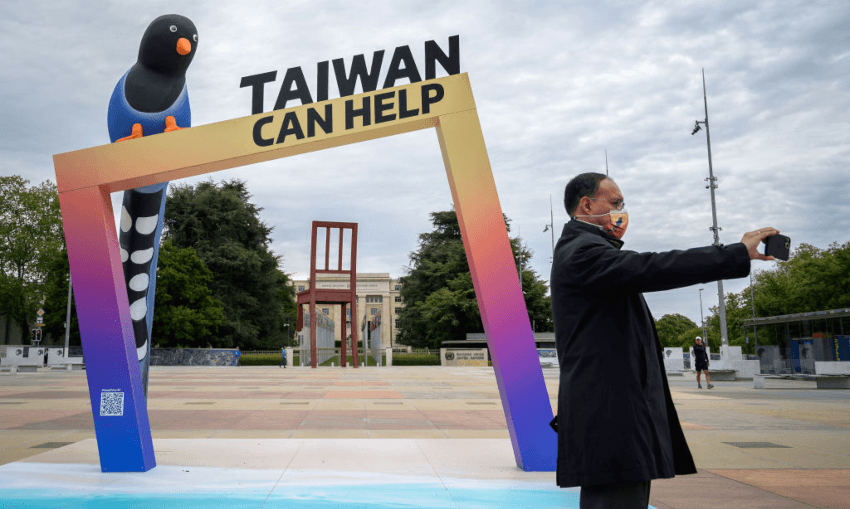As the US position on China and Taiwan comes under the spotlight, a former diplomat wrote of his ‘great shame’ at the missing NZ signature.
New Zealand remains committed to the push for Taiwan to be granted observer status at the World Health Assembly, despite its absence from a statement signed by the foreign missions of the US, Japan, Australia, Britain and Canada in Taiwan, foreign minister Nanaia Mahuta says.
In the missions’ joint statement posted at the weekend, representatives reiterated the call for an end to the exclusion of Taiwan, which is widely credited as running one of the most effective Covid responses, from the World Health Organisation forum, now under way in Geneva. It added: “Taiwan’s meaningful participation in the forums and technical committees of the World Health Organisation would benefit both the 24 million people on Taiwan and the world. Taiwan deserves acclaim for its accomplishments on public health security.”
While New Zealand’s trade mission in Taiwan was not among the signatories to the statement, Wellington continues to back the sentiment, Mahuta confirmed. “New Zealand supports Taiwan being able to participate as an observer in the World Health Assembly,” she said via a spokesperson. “This is a long-held position. We recognise that Taiwan makes a valuable contribution to international health discussions, as evidenced in recent years by its response to Covid-19. We will take a consistent approach at this year’s World Health Assembly meetings in Geneva.”
The Australian Office, AIT, British Office, Canadian Office & Japan-Taiwan Exchange Association reaffirm our support for Taiwan’s meaningful participation in the work of the @WHO & Taiwan’s participation as an observer at WHA. Read our joint press release: https://t.co/v7nTxK4op1 pic.twitter.com/KLaPjiyBFF
— Jenny Bloomfield (@AusOfficeTPE) May 21, 2022
New Zealand’s non-appearance came to light after a former senior diplomat, Charles Finny, wrote for BusinessDesk of his “great shame” at the “mystifying absence” of the NZ Commerce and Industry Office in Taipei from the signatory list. Finny, now a lobbyist and chair of the NZ-Taiwan Business Council, suspected it was down to “constant concern about minimising public utterances on Taiwan policy because of a concern that China might react negatively”. He wrote: “The Australian, US, Japanese, British and Canadian offices in Taipei did the right thing and stood up for Taiwan in the face of Chinese bullying. New Zealand did not. I am ashamed by this.”
Mahuta did not respond to a question on the reasons New Zealand was not a signatory. The government has previously opted not to add New Zealand’s name to statements from five eyes partners rebuking Beijing’s crackdown in Hong Kong.
The status of Taiwan, which continues to be denied nation status at the United Nations, has returned to the geopolitical spotlight after US president Joe Biden’s remarks during a visit to Japan. Against a backdrop of the US decision not to take military action in defence of Ukraine against Russia, Biden was asked whether they would defend Taiwan were it to come under attack by China. “Yes,” he told reporters. “That’s the commitment we made.” Biden swiftly added: “We agree with a one-China policy. We’ve signed on to it and all the intended agreements made from there. But the idea that it can be taken by force … is just not appropriate.”
The US, along with much of the world including New Zealand, publicly accepts a “One China” policy, which accepts China’s insistence Taiwan is a natural part of China, while maintaining independent relations with Taiwan, albeit not on a formal nation-state basis. US State Department officials strained to insist that Biden’s statement did not depart from the existing “strategic ambiguity” doctrine – the ambiguity referring directly to the question of whether or not the US would defend Taiwan militarily against a Chinese attack.
New Zealand was among the members of a higher-level, if nebulous agreement announced last night, the Indo-Pacific Economic Framework for Prosperity, alongside the US and 12 other countries in the region. Jacinda Ardern said the framework, on which discussions are continuing, was “a non-traditional agreement” to “provide new channels of collaboration in ways not limited to trade”, but that it could “ease the pathway for trade”.
From the perspective of the US, which remains divorced from the CPTPP since Donald Trump abandoned the trade deal, the new agreement appears substantially designed to counter China’s growing dominance and reassert American economic clout in the region.





